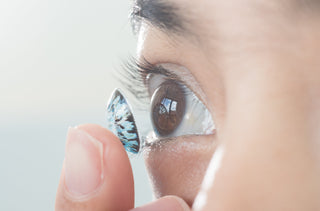It is no longer a secret: in order to be healthy, you need to have good lifestyle habits and a balanced diet. Carefully choosing the foods we consume is good for the body, and it is also great for the eyes. Did you know that certain types of foods can delay the progression of eye diseases? Here are the main nutrients that are important for keeping your eyes healthy.
Vitamins
Vitamins A, C and E are the most important for eye health. Since it is not possible for the body to store vitamins that have been dissolved in water, like vitamin C, it must be consumed often. This vitamin acts as an antioxidant and absorbs some of the sun's rays, which can reduce the risk of age-related macular degeneration (AMD). It is found in kiwis, peppers, broccoli and citrus fruits, while vitamin E can be found in nuts, seeds, eggs and orange peppers, amongst others. It contributes more particularly to the health of the retina, facilitating the absorption of vitamin A. It can thus reduce the risk of cataracts and AMD.
Zinc
The most important mineral for the eyes is zinc. It helps transfer vitamins A and E from the liver to the eyes, and contributes to the proper functioning of the cells of the eyes. It is found in turkey, lean red meat, whole grains and nuts. Oysters are also known to have the highest zinc content of all the foods that humans eat. Like vitamins A and E, zinc can help protect against AMD.
Omega-3 Fatty Acids
Omega-3 fatty acids carry vitamins in different parts of the body, including the eyes. Docosahexaenoic acid and eicosapentaenoic acid, also known as DHA and EPA, are two types of omega-3 fatty acids that are important for the eyes. They are also beneficial for the brain, heart and skin, and contribute to the health of the retina and Meibomian glands, located in the eyelids. Thus, eating foods that contain omega-3 fatty acids, such as oily fish and flaxseed, can help reduce ocular dryness.
Carotenoids
Carotenoids are pigments of natural origin, which give colour to fruits and vegetables. Beta-carotene, lutein and zeaxanthin are particularly important carotenoids for eye health. These last two are found in a part of the eye called the macula, and they are obtained by consuming foods that contain them. Lutein is found in leafy green vegetables, egg yolks and broccoli, and zeaxanthin in orange peppers, amongst others. Studies have shown that lutein can improve the condition of people affected by AMD. A diet that contains a lot of lutein and zeaxanthin can also help protect against cataracts. Beta-carotene is another important pigment for eye health. As its name suggests, it is found in carrots, as well as sweet potatoes and squash. This carotenoid is converted by the body into vitamin A, and can therefore reduce the progression of AMD and cataracts if consumed with other antioxidants.
Eating well and eating various nutritious foods can help prevent the most common eye diseases. Several recipes made from foods that contribute to good eye health are available on our blog. If you would like to learn more about diet and vision, check out Eye Food, written by Dr. Laurie Capogna and Dr. Barbara Pelletier, Optometrists.





















































